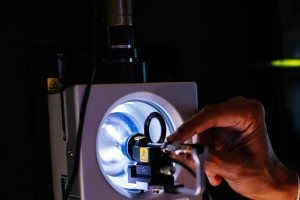The Latest from Mayo Clinic Laboratories
As the global reference laboratory for Mayo Clinic, Mayo Clinic Laboratories will help you advance patient care, strengthen your practice, and broaden access to specialized testing. Through our partnerships with clinicians at Mayo Clinic and health care providers around the world, we are able to offer the most sophisticated test catalog in the world. It is because of these daily collaborations that our subspecialized laboratories continue to be a critical component to patient care at Mayo Clinic.
|
|
Innovations set to shape the industry in 2025In this episode of “Answers From the Lab,” host Bobbi Pritt, M.D., chair of the Division of Clinical Microbiology at Mayo Clinic, is joined by William Morice II, M.D., Ph.D., CEO and president of Mayo Clinic Laboratories. They discuss Dr. Morice’s recent article in Becker’s Hospital Review, “Nine Developments Predicted to Shape Laboratory Medicine and Diagnostics in 2025.” |
 |
New test distinguishes between prion disease and other causes of rapidly progressive dementiaMayo Clinic’s RT-QuIC Prion test can distinguish prion disease from other types of rapidly progressive dementias. This innovative test, performed on cerebrospinal fluid, provides quick, accurate diagnoses, crucial for identifying treatable autoimmune dementias and enhancing patient care. This enables patients showing symptoms of a rapidly progressive form of dementia to get a definitive answer, quickly, with a highly sensitive test. |
 |
Unique test screens for recently identified peripheral neuropathySorbitol dehydrogenase (SORD) deficiency, recently identified, is a genetic condition that may cause peripheral neuropathy. In this test-specific episode of the “Answers From the Lab” podcast, Matthew Schultz, Ph.D., and Amy White, M.S., CGC, explain how Mayo Clinic Laboratories’ unique urine assay (Mayo ID: SORD) screens for this rare form of hereditary peripheral neuropathy. |
|
|
Assay identifies most known membranous nephropathy antigensMembranous nephropathy is an autoimmune disease that damages blood vessels in the kidneys. In this test-specific episode of the “Answers From the Lab” podcast, Sanjeev Sethi, M.D., Ph.D., explains how Mayo Clinic Laboratories’ new mass spectrometry test (Mayo ID: MSMN) identifies 13 antigens known to cause the disease, to guide precise patient treatment. |
Education Program
Case Studies in Laboratory Safety
April 8, 2025 | 11 a.m.–Noon CT. This webinar will provide a review of several real-life laboratory safety events. The presentation will outline the scenarios and the lessons learned and look at ways to prevent future incidents. We will also discuss ways to create effective corrective and preventive action plans.
How to Order Testing
Many hospitals across the country have already established an account with Mayo Clinic Laboratories. Please click on the links below to register for an account or sign-in.
Registration for an account takes less than 10 minutes, and new accounts are typically processed and available in one business day. Once registered, sign in and locate the test in the Test Catalog and click the “Order This Test” button. Follow the prompts to provide billing and contact information. Print the test requisition form to ship with the specimen.
More from Mayo Clinic Laboratories
Want to read more about what’s happening at our labs? Visit our blog!



